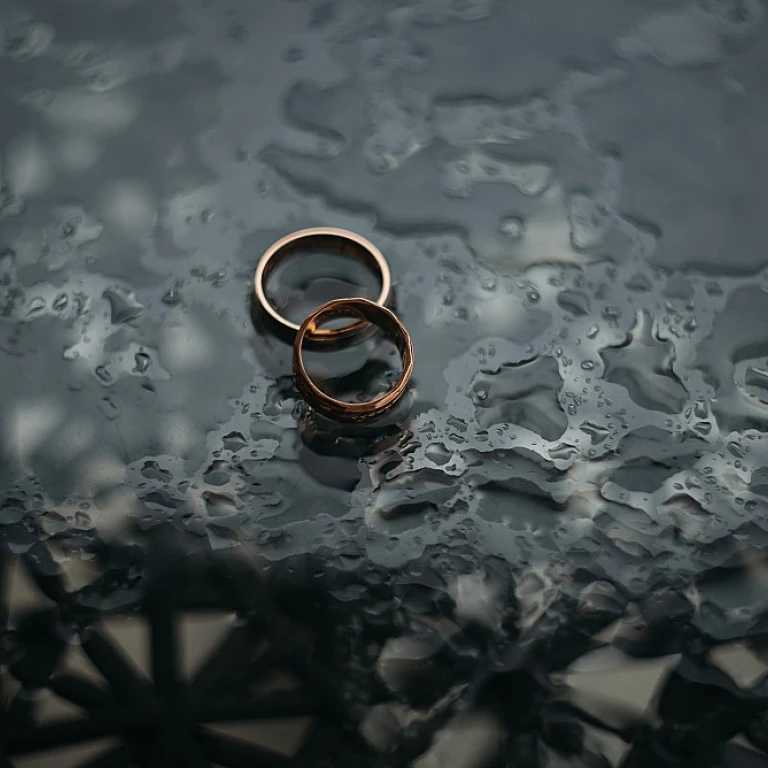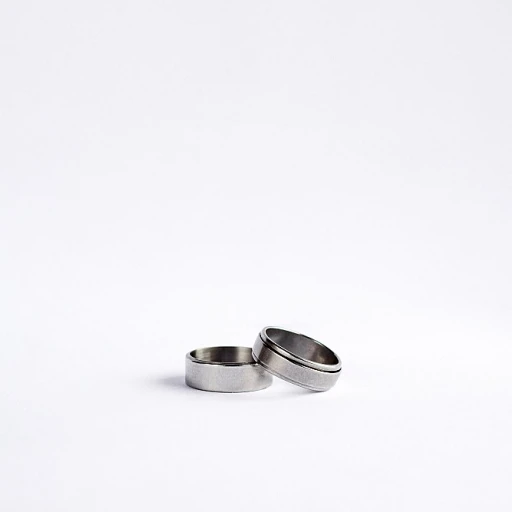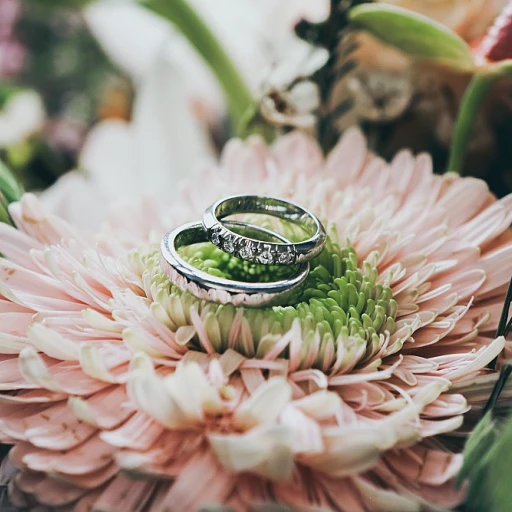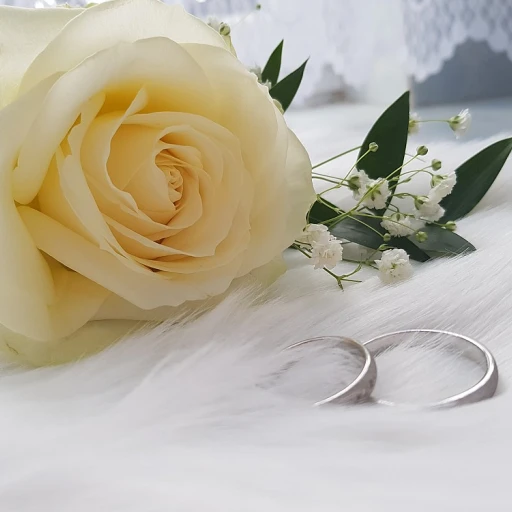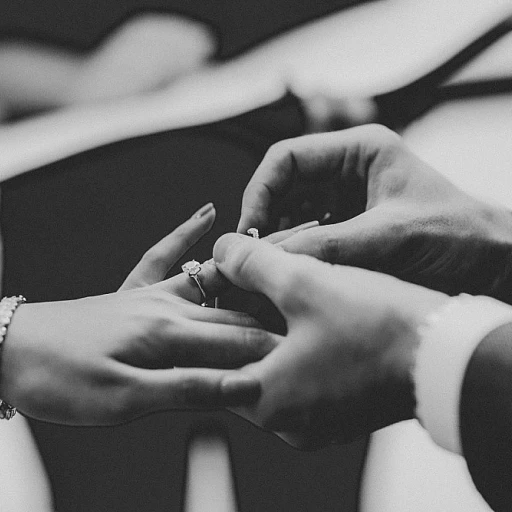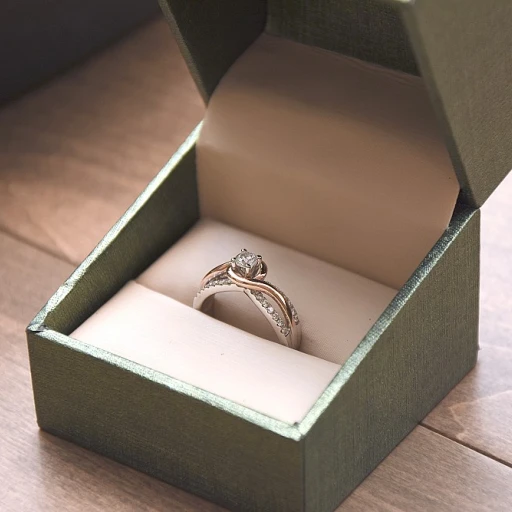Understanding Ethical Sourcing in the World of Wedding Rings
The Journey to Ethically Sourced Wedding Rings
When planning for a dream wedding, many couples are now taking an in-depth look into the origin of their wedding rings. Ethical sourcing is a significant concern, as it ensures that the jewelry you wear does not come at the cost of someone else's welfare or the environment. According to a recent survey, over 66% of consumers are willing to spend more on sustainable goods. For wedding rings, this means ensuring that the gemstones and metals used come from mines that provide fair labor practices and environmental stewardship.
Steps to Ensure Ethical Sourcing
To verify that your wedding ring is ethically sourced, start by researching the retailer's sourcing policies. Renowned jewelers often display their commitment to ethical practices online, showcasing transparency in their supply chain. Look for certifications such as Fairtrade Gold or the Responsible Jewellery Council to confirm the retailer's dedication to ethical standards. Additionally, consider reaching out directly to ask about sourcing – a genuine engagement from the retailer can be very telling.
Spotlight on Sustainable Gemstones
Currently, there's a surge in popularity for gemstones like conflict-free diamonds, lab-grown diamonds, and other ethically sourced stones. These popular choices reflect a trend towards sustainability in the jewelry industry, with consumers making a conscious decision to support ethical mining. For example, lab-grown diamonds offer a real alternative that's not only environmentally friendly but also reduces the social impact associated with traditional diamond mining.
Investing in Ethical Practices
Understanding the cost of ethical wedding rings is a pivotal aspect for future spouses. Though there's a common belief that ethical rings are more expensive, this is not always the case. The truth about the price of ethical wedding rings is sometimes surprising. For example, lab-grown diamonds typically cost 20-30% less than their mined counterparts, allowing couples to invest in sustainable pieces while potentially saving money. This investment in an ethical ring is not just monetary—it's an investment in love and a testament to your commitment to global sustainability.
Celebrating Ethical Choices Through Shared Experiences
There is a growing community of couples who are proudly sharing their decision to choose ethical wedding rings. These personal stories act as powerful testaments and set a precedent for future engaged couples. One compelling narrative describes a couple who traveled to a local mine to witness the ethical practices firsthand. Another couple opted for vintage rings, providing an exquisite solution that reuses existing jewelry, thereby reducing the need for new mining. These stories illustrate the personal commitment to ethical choices and the broader impact of those decisions.
How to Verify the Ethical Credentials of Your Wedding Ring
The Essentials of Ethical Sourcing for Wedding Bands
When it comes to choosing wedding rings, the term ethical sourcing is becoming increasingly pivotal. In simple terms, it refers to procuring gemstones and metals from mines that uphold human rights, provide fair wages, and minimize environmental impact. As ethically sourced wedding rings gain popularity, understanding their impact is crucial for couples looking to make informed decisions. According to a recent survey by The Knot, an estimated 1 in 4 millennials prefer ethically sourced rings, speaking volumes about this growing trend.
The Journey of a Stone: Traceability and Transparency
Traceability is the heart of ethically sourced gemstones. It enables couples to unearth the entire history of their chosen stone. Ensuring transparency in the supply chain can often be verified through certifications and documented proof from the seller. A report by the Responsible Jewellery Council highlighted that 86% of consumers feel better about purchasing jewelry that is traceably ethical. By choosing rings with a clear lineage, consumers take part in a broader movement for corporate accountability.
Certifications: Assurance of Ethical Practices
Certifications play a crucial role in verifying the ethical credentials of wedding rings. Organizations like the Kimberley Process and Fairtrade Gold offer peace of mind by ensuring the materials used adhere to strict labor and environmental standards. In fact, statistics from the Fairtrade Foundation indicate that Fairtrade-certified products have a growing market, with a 30% increase in sales in recent years, reflecting a consumer push towards ethical consumption.
Impact Beyond the Sparkle: Eco-Friendly and Conflict-Free
An ethically sourced wedding ring goes beyond just being conflict-free. It also encourages sustainable practices that lessen the ecological footprint. For instance, recycled gold is a sought-after choice for ethical wedding bands, as cited by market analyses showing a surge in the recycling of precious metals, aiming to reduce the destructive effects of mining. By making environmentally conscious choices, couples are investing not only in their love but also in the well-being of our planet.
A Matter of Human Rights and Community Development
Beyond the environment, ethically sourced rings consider the well-being of mining communities. Championing human rights, child labor laws, and economic development, these communities benefit from the ethical choices made by consumers. The Diamond Development Initiative (DDI) reports that ethically sourced practices have improved the livelihoods of over 1 million artisanal miners worldwide, illustrating the profound social impact that comes with a choice of a wedding ring.
Trending Now: Top Ethically Sourced Stones for Your Wedding Ring
Deciphering the Marks of Ethically Sourced Wedding Bands
As future guardians of marital bliss, it is essential to ensure that your symbol of love—the wedding ring—supports ethical practices. A staggering 19% of consumers, according to The Knot's 2021 Jewelry and Engagement Study, value the ethical sourcing of their rings. To verify the ethical credentials, look for certification systems such as the Kimberley Process, which aims to stop the flow of conflict diamonds, or the Responsible Jewellery Council, which certifies ethically sourced gold and other precious metals. A laser-inscribed certification number on the band itself is a discreet yet definitive mark of ethical assurance.
Navigating Certificates and Logos with Confidence
To the discerning eye, logos and certificates are more than mere adornments; they are a testament to the jeweler's commitment to sustainable practices. The Fairtrade Gold stamp, for instance, ensures miners are paid a fair price, contributing to substantial improvements in mining communities. Brands like Brilliant Earth and Tiffany & Co. provide "conflict-free" assurances, bolstered by in-depth gemstone traceability reports that reveal the stone's journey from mine to ring finger.
Questions to Ask Your Jeweler for Transparency
"Inquiring minds marry right." This twist on the old adage applies perfectly to the ethical wedding ring shopper. Ask jewelers:
- Where do the gemstones originate?
- Can they provide proof of ethical sourcing?
- What are their policies if a stone's ethical background is questionable?
These queries not only promote transparency but also push the industry towards more responsible practices, as a surge in demand for ethical sourcing sends a powerful signal to jewelers globally.
Tech Tools: The Digital Assistance in Ensuring Ethical Selection
The tech-savvy couple of today can leverage mobile apps and online platforms that offer extensive education on ethical sourcing. Applications like the Good on You and websites such as the Ethical Jewelry Exposé offer comprehensive guides on ethical jewelry brands. The advent of blockchain technology also adds a layer of verification, providing an unalterable record of a gemstone's ethical journey, ensuring consumers have access to irrefutable evidence of their ring's providence.
Making the Ethical Implication a Shared Responsibility
Couples today shoulder a shared responsibility in championing ethical sourcing. By carefully selecting wedding rings that adhere to ethical standards, they are creating a ripple effect, encouraging 40% of businesses to increase their commitments to social responsibility, as reported by the Global Sustainability Study. This collective action does not just build a better industry—it constructs a more equitable world for future married couples to treasure.
The Real Cost of Ethical Wedding Rings: Investment in Love and the Planet
Eco-Conscious Sparkles: Popular Ethically Sourced Stones
The allure of precious gemstones in the context of marriage is undeniable, and with more couples prioritizing global sustainability, the focus on ethically sourced stones has never been more vital. Recent statistics reveal that searches for "sustainable wedding rings" have surged by 75% in the past two years, illustrating a shift in consumer values towards ethical consumption. Among the frontrunners in this ethical transformation are diamonds, sapphires, and rubies known for their conflict-free, fair trade certifications.
Diamonds: Beyond Blood and Conflict
Diamonds are often the first choice for wedding rings. However, traditionally mined diamonds have a history marred by conflict and environmental damage. As an analyst, I can affirm that the trend towards conflict-free diamonds has not only been beneficial in preventing funding warzones but also in supporting local communities. These diamonds are meticulously tracked from mine to market, ensuring that each purchase contributes to humanitarian causes. One such example includes the growing interest in Canadian diamonds, which are mined under strict environmental regulations, providing a guilt-free sparkle to ethically minded consumers. A survey by The Knot in 2021 reported that 2 out of 5 couples now prefer ethically sourced diamonds for their symbolic value and minimal ecological footprint.
Radiant Sapphires: A Spectrum of Ethical Brilliance
Sapphires, with their spectrum of colors, present a vibrant alternative to traditional diamonds. Not only do they rank high on the Mohs scale of mineral hardness, making them a durable option for daily wear, but they are also increasingly harvested in compliance with eco-friendly practices. Responsible sapphire sourcing supports biodiversity, water preservation, and reduces the overall environmental impact. Citing a report by the Responsible Jewellery Council, sales of sapphires from Sri Lanka and Madagascar—known for their ethical mining practices—have seen a 20% increase recently, highlighting the consumer's inclination towards stones that carry a story of positive ecological and social impact.
Rubies: A Crimson Commitment to Ethical Jewellery
Embodying passion and love, rubies are another popular choice for those seeking ethically sourced wedding rings. The appeal of a ruby's deep red hue is enriched by choosing stones from transparent supply chains. For example, rubies from Myanmar, which have been subject to trade embargoes, are being replaced by those from Mozambique, where mines operate with a commitment to social empowerment and environmental stewardship. A significant factor influencing buyers today is the fact that meticulously documented supply chains for rubies allow couples to wear their love with integrity. Industry insiders note that ethical ruby sales have had a steady 30% growth rate for the past three years among eco-conscious consumers.
It's evident that the collective consciousness towards ethical sourcing in the wedding industry is on the rise, with compelling stories of empowerment, environmental preservation, and social responsibility becoming an integral part of the narrative that accompanies a couple's commitment. When choosing a wedding ring that aligns with ethical values, one can not only make a statement of love but also a statement of conscientious choice, echoing a promise to cherish each other and the world we inhabit.
Personal Stories: Couples Who Chose Ethical Sourcing
Understanding the Price Tag on Ethical Wedding Bands
When couples embark on the journey of matrimony, their commitment is symbolized by the exchange of wedding rings. However, behind the glimmer of these precious bands may lie a complex narrative about their origins. Ethical wedding rings aren't just a trend; they represent a conscious decision to invest in love and the planet—but at what cost? According to a study by The Knot, the average spend on a wedding ring was over $5,000 in 2021, but ethical wedding rings can command a premium due to responsible sourcing and labor practices. Such an investment isn't merely monetary but also emotional and ethical, encapsulating the heightened awareness and commitment of couples to global sustainability.
Finding a Balance between Ethics and Expenses
It's a delicate balance to strike between ethical considerations and budget constraints. Partners are often caught in a dilemma - the desire to uphold ethical standards without breaking the bank. However, ethical wedding rings do not necessarily mean exorbitant costs. By selecting recycled metals or lab-grown diamonds, which have witnessed a surge of 7% in popularity according to a Diamond Producers Association report, couples can uphold ethical standards while remaining fiscally responsible. This approach amalgamates ecological responsibility with economic sensibility, illustrating that ethical choices can be accessible to a wide range of budget-conscious consumers. Nonetheless, it is essential to note that responsibly sourced materials often come with a story of fair labor and reduced environmental impact, factors that are priceless.
The Long-Term Value of Ethical Ring Choices
Ensuring that a ring does not come with a hidden cost to communities or the environment is a testament to a couple's values. This level of commitment can indeed carry a higher initial price tag with, for instance, responsibly mined gold costing about 20-30% more than regular gold, as reported by ethical jeweler surveys. However, considering such rings as an investment in the future—akin to investing in high-quality, sustainable goods—has its own set of rewards. Over time, ethical wedding rings can contribute to diminishing the demand for conflict minerals, thereby fostering a more sustainable and equitable industry. Such long-term contributions to the well-being of both the planet and its inhabitants can't be overstated.
Testimonials That Build Trust and Highlight Value
Personal narratives about selecting ethical wedding rings resonate deeply with prospective couples. For instance, testimonials from those who have navigated the ethical gemstone market successfully can be compelling. These stories often detail the satisfaction derived from knowing the positive impact of their purchase. Anecdotes about artisanal miners receiving fair wages, or how environmentally friendly practices helped preserve local ecosystems, can add value beyond the ring itself. Such testimonials and case studies serve as qualitative evidence illustrating how sustainable choices translate to real-world impact, effectively weaving together the personal joy of wedded bliss with the broader tapestry of societal and environmental responsibility.

